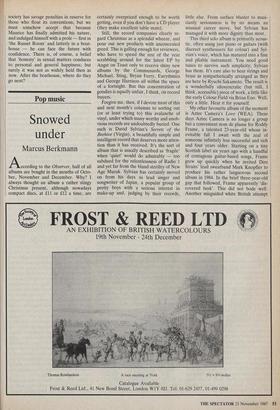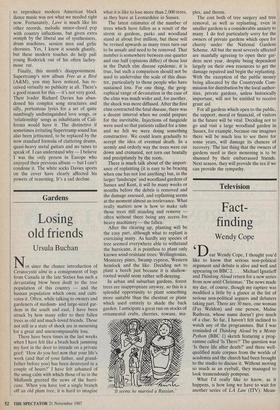Pop music
Snowed under
Marcus Berkmann
According to the Observer, half of all albums are bought in the months of Octo- ber, November and December. Why? I always thought an album a rather stingy Christmas present, although nowadays compact discs, at £11 or £12 a time, are certainly overpriced enough to be worth getting, even if you don't have a CD player (they make excellent table mats).
Still, the record companies clearly re- gard Christmas as a splendid wheeze, and pour out new products with unconcealed greed. This is galling enough for reviewers, who have to spend the rest of the year scrabbling around for the latest EP by Angst on Toast only to receive shiny new albums by the Communards, George Michael, Sting, Bryan Ferry, Eurythmics and George Harrison all within the space of a fortnight. But this concentration of goodies is equally unfair, I think, on record buyers.
Forgive me, then, if I devote most of this and next month's columns to sorting out (or at least trying to) this avalanche of vinyl, under which many worthy and unob- vious records are undoubtedly buried. One such is David Sylvian's Secrets of the Beehive (Virgin), a beautifully simple and intelligent record that deserves more atten- tion than it has received. It's the sort of album that is usually described as 'fragile' when 'quiet' would do admirably — too subdued for the relentlessness of Radio 1 and yet far from the bland sterility of New Age Muzak. Sylvian has certainly moved on from his days as lead singer and songwriter of Japan, a popular group of pretty boys with a serious interest in make-up and, judging by their records, little else. From surface bluster to musi- cianly seriousness is by no means an unusual career move, but Sylvian has managed it with more dignity than most.
This third solo album is primarily acous- tic, often using just piano or guitars (with discreet synthesisers for colour) and Syl- vian's voice, which has matured into a fine and pliable instrument. You need good tunes to survive such simplicity; Sylvian has them. It's rare also to hear strings and brass as sympathetically arranged as they are here by Ryuchi Sakamoto. The result is a wonderfully idiosyncratic (but still, I think, accessible) piece of work, a little like the early Colour Field via Brian Eno. Well, only a little. Hear it for yourself.
My other favourite album of the moment is Aztec Camera's Love (WEA). These days Aztec Camera is no longer a group but a convenient nom de plume for Roddy Frame, a talented 23-year-old whose in- evitable fall I await with the zeal of someone infinitely less successful and rich and four years older. Starting on a tiny Scottish label six years ago with a handful of contagious guitar-based songs, Frame grew up quickly when he invited Dire Straits' lead sweatband Mark Knopfler to produce his rather languorous second album in 1984. In the brief three-year-old gap that followed, Frame apparently 'dis- covered funk'. This did not bode well. Another misguided white British attempt to reproduce modern American black dance music was not what we needed right now. Fortunately, Love is much like his other records, melodic minor-chord pop with country inflections, but given extra oomph by the liberal use of synthesisers, drum machines, session men and girlie choruses. Yes, I know it sounds ghastly, but these modern touches do help pull young Roderick out of his often lachry- mose rut.
Finally, this month's disappointment. Supertramp's new album Free as a Bird (A&M), you may have noticed, has re- ceived virtually no publicity at all. There's a good reason for this — it's not very good. Their leader Richard Davies has aban- doned his complex song structures and silly, portentous lyrics for a set of quite numbingly undistinguished love songs, or 'relationship' songs as inhabitants of Cali- fornia would have it. The distinctive if sometimes irritating Supertramp sound has also been jettisoned, to be replaced by the now standard formula of clattering drums, quasi-heavy metal guitars and no tunes to speak of. I can understand why — I believe I was the only person in Europe who enjoyed their previous album — but I can't condone it. The white socks Davies sports on the cover have clearly affected his powers of reasoning. It's a sad decline.



































































 Previous page
Previous page